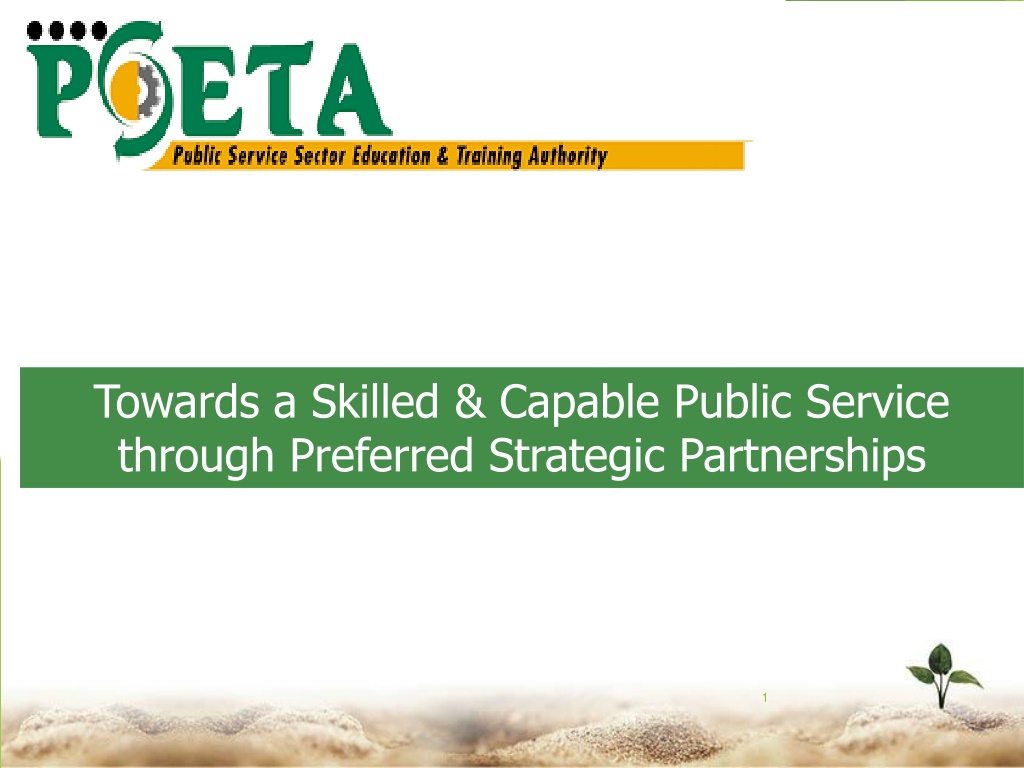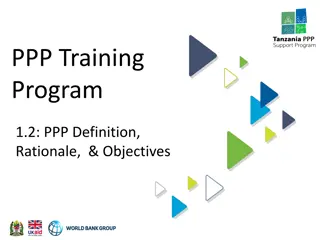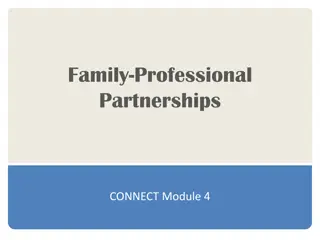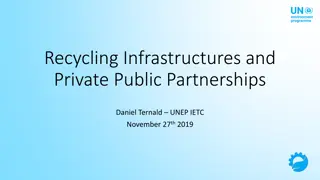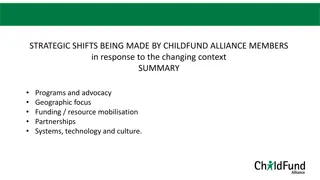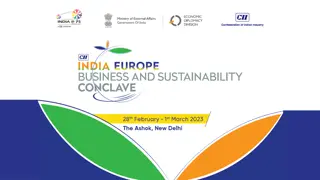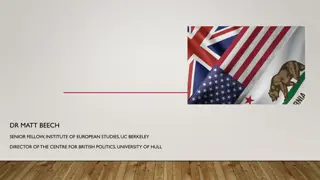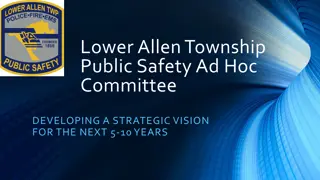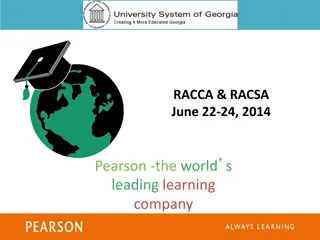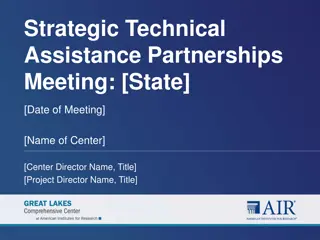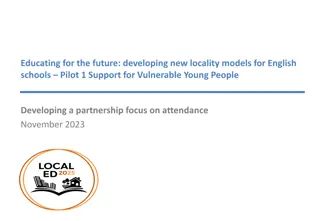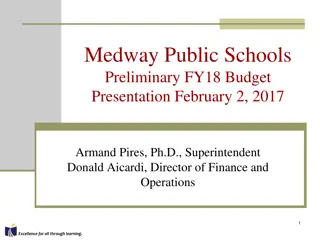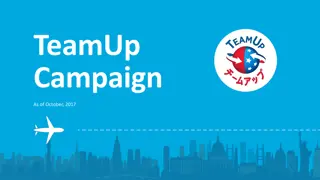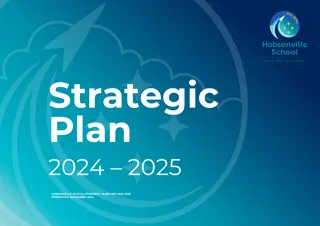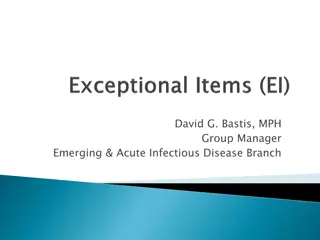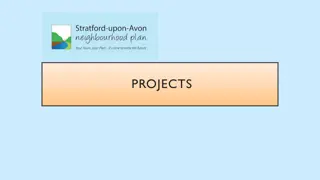Developing Skilled Public Service through Strategic Partnerships
Focused on enhancing the skills and capabilities within the public service sector, this initiative emphasizes effective coordination, learning programs, and promoting absorption of qualified individuals. Key elements include a mission to lead in human capital development, measuring impact on employment and sector growth, and implementing the Sector Skills Plan to address skills gaps.
Download Presentation

Please find below an Image/Link to download the presentation.
The content on the website is provided AS IS for your information and personal use only. It may not be sold, licensed, or shared on other websites without obtaining consent from the author. Download presentation by click this link. If you encounter any issues during the download, it is possible that the publisher has removed the file from their server.
E N D
Presentation Transcript
Towards a Skilled & Capable Public Service through Preferred Strategic Partnerships 1
Presentation Outline Mission Priority Arears Discretionary Grant 2017/2018 Policy, Criteria & Guidelines Key Development Imperatives Cutting Edge Skills for Quality Public Services
Mission: Leading in the development of skilled and competent human capital in the Public Service Sector through: effective coordination interventions based on occupationally directed qualifications; focusing on learning programmes; and promoting learner placement and absorption within the public sector. of skills development Cutting Edge Skills for Quality Public Services 3
Impact (measuring contribution to employment and sector growth) NDP, NGP, NSDS, SDA mandate and other government priorities Impact (measuring changes in skills level, competencies in PSETA labour market) SSP Outcomes (measuring 5 year goals & strategic objectives) Strategy Outputs (measuring MTEF indicators and annual targets) APP Targets (measuring targets agreed with DHET) SLA Activities (measuring operational efficiencies of the organisation) OPS PLAN Cutting Edge Skills for Quality Public Services
What is the Sector Skills Plan? The Sector Skills Plan is a framework within which PSETA identifies key priorities and critical skills development trends, objectives and priority areas. It must provide a sector profile and analysis of the demand for, and supply of skills in the Public Service sector to inform a responsive intervention of priority skills development in the sector. In terms of the Skills Development Act a SETA must: Develop a 5-year Sector Skills Plan (SSP) (aligned to NSDS): Annually update the SSP through research, stakeholder consultation & Identify HTVs and skills gaps through the Workplace Skills Plan (WSP) analysis. Develop a Strategic Plan (SP) and Annual Performance Plan (APP) that informs the implementation of the SSP. Cutting Edge Skills for Quality Public Services
Consideration of NDP Institutional focus A stable political-administrative interface A public service which is a career of choice Sufficient technical and specialist professional skills Efficient and effective management and operations systems Procurement systems that deliver value for money Strengthened delegation, accountability and oversight Improved inter-departmental coordination Reduced corruption in the public service The identification of priority skills and training initiatives should thus be shaped by an analysis of the major drivers / inhibitors of public sector organisations performance in South Africa PSETA SSP 2016/17 Cutting Edge Skills for Quality Public Services
Key Skills Priority Actions identified in the SSP Priority 1: Establishing strategic partnerships with key departments Priority 2: Improving the capacity of state training and learning institutions in the sector Priority 3: Focus on workplace based learning to lead the making of the workplace a training space Priority 4: Delivery of training through alternative, cost effective and efficient mechanisms Cutting Edge Skills for Quality Public Services
Scarce Skills SCM & Contract Management Occupations Management related Occupations HRD Occupations Personnel / Human Resource General Manager Public Service Finance Manager HRD Occupations Manager Senior Government Official Business Training Manager Physical Asset Manager Senior Government Manager Recruitment Manager Contract Manager Supply and Distribution Manager Director (Enterprise / Organization) Labor Recruitment Manager Skills Development Facilitator / Practitioner Policy and Planning Manager Warehouse Manager Training and Development Professional Occupational Instructor / TrainerProcurement Cost and management accountants Quality systems manager Archives Manager officers Operations Manager (Non- Manufacturing) Database Designer and Administrator Systems Administrator Supply Chain Practitioner
Background PSETA has been allocating funds utilising an open call process. An advert was placed in the public platform to invite qualifying institutions. Funds were allocated to provider who qualified based on the criteria and guidelines This process, though honourable, presented al lot of challenges due to the nature of our stakeholders/ beneficiaries Delays in contract signing and subsequent implementation by stakeholders Delays and difficulties in procuring training providers by stakeholders Evidence submitted not always supporting the payment requirements Cutting Edge Skills for Quality Public Services
Background Cont Payments not submitted on time High levels of contract extensions These challenges have had a negative impact on PSETA SLA targets are negatively impacted, thereby impacting to the overall performance of the SETA Allocated funds do not move as per the project plans Commitments get distorted and attracts audit qualification Costs escalates due to excessive extensions Cutting Edge Skills for Quality Public Services
PSETA Strategic Funding Approach Partnership Forums Higher Education Institution Provincial Government (Office of the Premier) Lead National Departments Training intermediaries (TVETs, Academies, HEIs, NSG) Memorandum of Agreements (JVAs) Cutting Edge Skills for Quality Public Services
The role of partners The first one relates to the role central government departments that champion certain competencies within the two spheres of government can play in informing the skills demand The first second talks to capabilities of public training institutions to respond to the needs of the public service sector priorities (skills supply). PSETA ensuring that there is alignment between the demand and supply of skills. By identifying appropriate mechanisms and provide systemic information PSETA can direct its funding to interventions that bridge the gap between supply and demand of skills in the Public service. Cutting Edge Skills for Quality Public Services
Approved Discretionary Grant Policy Policy objectives PSETA funding approach Scope and application Exclusions Key principles Grant allocation Access to Discretionary Grant Criteria and guidelines and funding framework Cutting Edge Skills for Quality Public Services
Approved Discretionary Grant Policy Policy objectives PSETA funding approach Scope and application Exclusions Key principles Grant allocation Access to Discretionary Grant Criteria and guidelines and funding framework Cutting Edge Skills for Quality Public Services
Approved Discretionary Grant Policy Assessment of proposals Adjudication and approval of applications Contracting and contract management Extensions and terminations Cutting Edge Skills for Quality Public Services
Benefits Increase in number of projects achieving expected benefits, on time, on budget and within scope Alignment of projects investments to business strategy Efficient management of PSETA resources Decrease project risk exposure Reduction in project overheads/ bureaucracy elimination of heavy process Increase in organisation's ability to plan Cutting Edge Skills for Quality Public Services
Programmes for 2017/2018 Funding & PSPs LEARNING PROGRAMME STRATEGIC PARTNERS PERFORMANCE APP NSDS III GOAL INDICATOR TARGET NC: Public National Treasury Administration Provincial Academies Unemployed Procurement (50060) TVET Colleges Entered 200 (100 learners) Learnership Certificate: Accounting Increase access Technician (73710) (100 to learners) Financial Management occupationally Flavious Mareka directed Human Resources Motheo TVET programmes Management Maluti TVET Unemployed 150 Public Enkangala Entered Bursaries Administration/Managem Ehlanzeni ent Gert Sibande Cutting Edge Skills for Quality Public Services
Programmes for 2017/2018 Funding & PSPs LEARNNG STRATEGIC PERFORMANCE APP PROGRAMME PARTNERS NSDS III GOAL INDICATOR TARGET Plumber Western Cape Mechanical Fitter, Department of Electrician, Economic Automotive Motor Development and Mechanic, Tourism Increase access to Diesel Mechanic Mpumalanga Artisans Entered 40 occupationally directed Department of programmes Public Works Roads and Transport Cutting Edge Skills for Quality Public Services
Programmes for 2017/2018 Funding & PSPs LEARNNG STRATEGIC PERFORMANCE APP PROGRAMME PARTNERS NSDS III GOAL INDICATOR TARGET Management DOJ (Courts) Assistant DHA Public Management Ingwe TVET Human Resources King Hintsa Promoting the growth of a Management Maluti TVET public TVET college TVET Student NC Rural system that is responsive Placement 300 NC Urban to sector, local, regional Entered Waterberg and national skills needs Capricorn and priorities Cutting Edge Skills for Quality Public Services
Programmes for 2017/2018 Funding & PSPs PERFORMAN LEARNNG PROGRAMME PREFERRED NSDS III GOAL CE APP TARGET STRATEGIC INDICATOR PARTNERS The NC: Public Administration Justice Workers Leadership (50060) Academy Entered 200 Certificate: Accounting National Treasury Learnerships Technician (73710) Monitoring & Evaluation DPME Workers Encouraging better Entered 60 use of workplace- Bursaries based-skills Mentoring & Coaching NSG programmes Public Service Project Provincial Workers Management Academies Entered Skills 900 Monitoring & Evaluation Programmes Cutting Edge Skills for Quality Public Services
Discretionary Grant Amounts by Programme Programme Grant per learner Provinces What it covers R33 855 Free State (50) Training Costs Learnership (Workers) Gauteng (50) Training Material Leadership (183 credits) Assessments R21 000 National (50) Learnership Workers Moderation W. Cape (50) (Accounting) Stationery Training Venue Catering for Orientation day Training Costs (R33855) R53 785 per Kwa Zulu Natal (50) Learnership Unemployed learner North West (50) Learner Stipend (R24000) Procurement (161 credits) R45 000 per Eastern Cape (50) Training Costs (R33855) Learnership Unemployed learner Limpopo (50) Learner Stipend (R24000) Accounting (120 credits) Cutting Edge Skills for Quality Public Services
Discretionary Grant Amounts by Programme Programme Grant per Provinces What it covers learner Maximum of Mpumalanga (75) N4, N5 and N6 TVET Bursaries R120 000 per Free State (75) Tuition, Books Unemployed learner Accommodation and 18 months Work Experience stipend on completion of N6 (Bursary Conditions apply) Maximum of Nationally (60 learners) Training Costs only Bursary Workers R40 000 per learner R45 000 per Eastern Cape (80) Learner stipend for 18 months at R2500 TVET Student learner Free State (80) per learner per month Placement Limpopo (60) Northern Cape (80) Cutting Edge Skills for Quality Public Services
Discretionary Grant Amounts by Programme Programme Grant per learner Provinces What it covers R4 000 per All provinces - 46 learners per Training Material Skills Programme learner province (including legislatures & Assessments Monitoring & Parliament) and 90 for National Moderation Evaluation SP Departments Stationery Training Venue R1600 per learner 50 workers per province Skills Programme Catering for the duration of the training Eastern Cape Mentoring & Free State Coaching Limpopo Northern Cape R5200 per learner 40 workers per province Skills Programme Gauteng Project Management Mpumalanga North West KwaZulu Natal Western Cape Cutting Edge Skills for Quality Public Services
Discretionary Grant Amounts by Programme Programme Grant per Provinces What it covers learner R150 000 per 20 per province As per the Generic National Artisan Workplace Data, Artisan learner as per Western Cape Learner Grant Funding and Administration System Development Mpumalanga Policy, the grant is for: The institutional practical and Workplace training component, Over a period of the artisan programme from agreement registration to certification The grant excludes the TVET College theory component Cutting Edge Skills for Quality Public Services
Roles of Preferred Strategic Partners Programme Learnership Academies & TVETs Submit proposal to PSETA OTPs Departments Release Enter into MoU s with Must be accredited for all the PSETA workers to Leadership & electives in the learnership Coordinate the nomination attend training, Procurement Enter into an MoA with PSETA of workers and the Learner travel Provide Training Venue, Conduct selection and recruitment costs to training, assessments & moderation of unemployed learners training venue PSP : National Treasury Pay learner stipends Coordinate the signing of Provide Learnership learner commitment forms learners with Submit Proposal to PSETA (Accounting Coordinate the placement mentoring and Enter into an MoA with PSETA Technician) of unemployed learners coaching Appoint and enter into a SLA with an within provincial Manage accredited training provider departments learner Manage the provider to ensure Enter into employment workplace timeous delivery of SLA targets contracts with unemployed attendance (including the payment of learner learners stipends Lead the project steering committee Cutting Edge Skills for Quality Public Services
Roles of Preferred Strategic Partners Programme TVETs DOJ & DHA Submit Proposal Bursary Enter into an MoA with PSETA Select matriculants in line with Enter into an MoU with PSETA NSFAS/TVET bursary policy Submit a Proposal Enter into an MoU with PSETA Work Integrated Enter into an MoU with PSETA Provide PSETA with a number of workplace Learning Enter into an MoA with PSETA spaces available for placement Provide a list of learners in need Recruit & select learners in line with of WIL department s policies Monitor the relevance and Enter into 18 months contracts of employment adequacy of WIL with learners Administer the payment of Appoint learners on PERSAL learner stipends in line with Provide learners with resources (workstations) PSETA Policy Provide Mentorship & Coaching Monitor and report learner workplace attendance Cutting Edge Skills for Quality Public Services
Roles of Preferred Strategic Partners Programme Skills NSG/PAs & TVETs Submit proposal clearly OTPs/National Departments Enter into MoU s with Departments Release workers to attend indicating the skills PSETA training, Programmes programme and the Coordinate the nomination Learner travel costs to province applying for of workers training venue Enter into an MoA with Coordinate the signing of PSETA learner commitment forms Provide Training Venue, Lead the project steering Conduct training, committee assessments & moderation Partnership agreement/MoU with the TVET College, if the institutional practical component will Artisan not be covered by the lead/host employer. Development Partnership agreement/MoU with the host employer, if the lead employer has no/limited Requirements resources to cover activities of the trade(s). Workplace Approval letter or the ability to attain the approval. Learners with minimum education qualification to access trade test (N2 or NCV level 3). Cutting Edge Skills for Quality Public Services
Opportunity planned for training per province PUBLIC SERVICE EMPLOYEES UNEMPLOYED YOUTH 146 140 136 136 160 96 96 96 130 86 86 86 110 95 80 50 50 20 0 Cutting Edge Skills for Quality Public Services
Key Development Imperatives The PSETA funding framework is guided by, and measured against the seven NSDS III key development imperatives Stakeholders should, in recruitment and selection of learners adhere to the following equity targets: Black - 85% Women - 54% PWD - 2% PSETA funding, especially for the unemployed youth is biased towards the provision of skills for rural development Cutting Edge Skills for Quality Public Services
Application Requirements Each project should have a separate signed application form Applicants must submit 1 original and 3 copies of sealed proposals. The due date for submission is 21 June 2017 at 16h00 No late applications will be considered. Applications must clearly be marked as Discretionary Grants Application in the visible area in the proposal envelop/pack. Hard copies of grant applications must be delivered to 353 Festival Road, Hatfield 0028 Pretoria by close of business The box is made available at the main entrance of PSETA All applicants must ensure that the submission register is signed by their messenger. PSETA will not take responsibility for missing proposals where the register was not signed. No application will be accepted if it is not deposited in the proposal box by the deadline. Only hand delivery or courier will be accepted. It is the applicant s obligation to ensure the document is submitted to the correct physical address and physical proof (delivery note of sending the specified document via hand delivery or courier) is retained. Cutting Edge Skills for Quality Public Services
